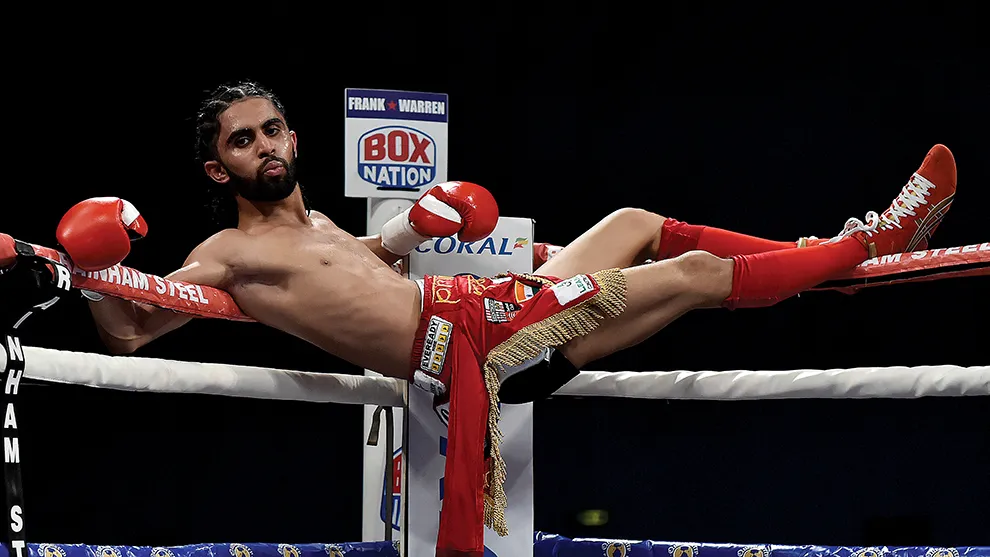I wanted to dislike Prince Patel. I wanted him to fulfill his reputation as a controversial figure. I was hoping for controversial quotes, outrageous self-promotion, and unwarranted insults. However, something unexpected happened. After spending a few hours with Prince Patel, I found myself actually liking him. This is surprising considering how many people in the British boxing community dislike him, including fellow contenders, champions, ex-pros, journalists, and fans.
Maybe it was because our conversation took place without an audience. Maybe it was because it wasn’t on social media or in front of a television camera. Or maybe it’s because Prince Patel, who is now 30 years old, is older and wiser. He realizes that time is running out for his dream of becoming a world champion. He understands that he needs to build bridges instead of burning them. He also acknowledges that many people don’t appreciate the theatrics of professional wrestling, which is where he took inspiration from as a young pro.
“In wrestling, I always preferred the heels,” he says. “Look at [WWE champion] Roman Reigns – he’s brilliant as a heel. As a face [good guy], he was boring. I used to watch ‘Stone Cold’ Steve Austin disrespecting his boss live on TV; it brought in huge viewing figures. D-Generation X [a rebellious wrestling faction] were my heroes growing up. So [when I turned pro], I wanted to be the bad guy.
“The idea in pro boxing is to get people talking. It’s showbusiness. The things I said were just to spark a reaction; I wanted people to talk about me. Let’s face it, as a flyweight/bantamweight, nobody would have cared otherwise.
“I thought I was doing a good thing. I thought it was obvious it was tongue in cheek. Muhammad Ali didn’t go home to his family and shout at them ‘I’m the Greatest!’. I’m just an ordinary guy. I do a lot of charity work. If there’s a way I can help somebody, I will. Charity has been ingrained in me by my mom.
“But people looked at that persona, thought that was the real me, and disliked it. It must have been an Oscar-worthy performance! But yeah, it backfired.”
Prince Patel turned pro in October 2015 after a successful amateur career. Despite his achievements in the amateur ranks, he claimed to dislike the unpaid code as he “wasn’t allowed to express myself.” He wasted no time in adopting a character once he transitioned to the professional ranks.
In an interview following his pro debut, he attracted more attention than he ever did in his 53 amateur bouts. He presented himself with swagger and entitlement, insulting then-English champion Charlie Edwards and his father, predicting greatness for himself, claiming to “like inflicting pain,” and making crude references to his sexual prowess and body parts. If it was a deliberate attention-seeking tactic, it worked.
“After that, everyone wanted to sign me,” says Patel, who ultimately signed with Frank Warren. He believed that his bombastic personality combined with Warren’s influence would be a perfect partnership. However, things didn’t go as planned. Patel only had three low-key fights over the next two years before his contract with Warren expired.
“I never had Warren’s number, so I called his office every day for six months straight, and they always said ‘oh, you’ve just missed him,’ and he never called me back,” says Patel. “He wasn’t keeping me active. Lesser guys than me – no disrespect to them – were getting opportunities while I was on the shelf.
“Even the Vijender [Singh] show in India [in July 2017], it would have made perfect sense to take me, but they just said no.”
After parting ways with Warren, Patel’s career took a different path. He traveled the world as a self-managed boxer, fighting in 10 different countries across Europe, Africa, and the Middle East. He fought in 24 bouts over the next six years and collected 20 belts along the way.
While some of the belts may be meaningless, there is one crown that holds genuine value. In March 2021, Patel became the first Indian to win a Commonwealth championship. He defeated Tanzania’s Julias Thomas Kisaware in Ghana. Unfortunately, this achievement was overlooked by Boxing News, adding to Patel’s belief that he was being intentionally ignored.
“I used to buy Boxing News every week, but I stopped because they never wrote about me,” Patel admits. “I don’t understand how certain boxers get write-ups, yet I’m British and winning recognized titles, and I don’t even get a mention.”
Overall, Patel’s career has had its highs and lows, but his experience has taught him valuable lessons. As he continues his journey in boxing, he understands the importance of building relationships and making the right connections. Whether he embraces his controversial persona or not, Prince Patel remains a fighter with a unique story.
Source link
